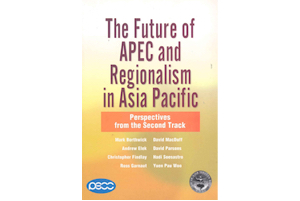 The Future of APEC and Regionalism in Asia Pacific - Perspectives from the Second Track
The Future of APEC and Regionalism in Asia Pacific - Perspectives from the Second Track
Edited by Mark Borthwick, David MacDuff, Andrew Elek, David Parsons, Christopher Findlay, Hadi Soesastro, Ross Garnaut and Yuen Pau Woo
Sponsored by the Centre for Strategic and International Studies Jakarta, Indonesia
and Pacific Economic Cooperation Council
Published in 2005 by Centre for Strategic and International Studies (CSIS)
This volume is a collection of recent essays on Asia Pacific economic cooperation and confronts some of the most pressing issues in trans-Pacific cooperation today. The phenomenal economic growth and development achieved during this current era of globalization has been accompanied by the contradictory forces of fragmentation and integration. Links between individuals are unprecedented adn information can be shared at the click of a button. These trends pose serious challenges as well as opportunities for policy makers. The opportunity is that policy makers can adopt successful policies form around the world to hasten economic development. The challenge is that the inefficiency of the global economy is insensitive to domestic political and societal needs. International and regional institutions can help build the individual and collective confidence to engage in the global economy as well as softening often painful change.
The contributors tackle isuuses such as the possibility of binding commitments within the APEC process, the restructuring of the APEC Secretariat into an OECD-type institution, US attitudes towards greater East Asian integration, and rethinking what open regionalism means today.
Contents:
1. Re-writing APEC's Approach?
2. APEC as a Pacific OECD
3. The Mid-term Review of the Bogor Goals: Strategic Issues and Options
4. A Review of the APEC Individual Action Plan Peer Review Process
5. The Challenges of Good Governance: The Role of APEC
6. The United States in an Asia Pacific Community
7. A New Open Regionalism in the Asia Pacific
